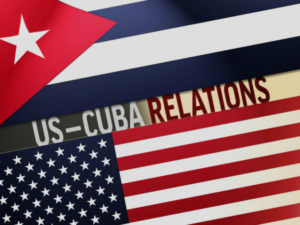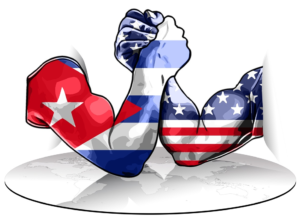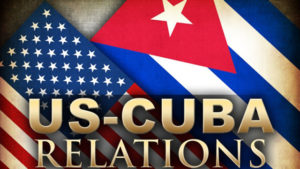 EEUU AUTORIZA DEMANDAS CONTRA LAS EMPRESAS CUBANAS INCLUIDAS EN SU “LISTA NEGRA”.
EEUU AUTORIZA DEMANDAS CONTRA LAS EMPRESAS CUBANAS INCLUIDAS EN SU “LISTA NEGRA”.
El secretario estadounidense de Estado, Mike Pompeo, anunció este lunes que mantendrá suspendido durante un mes más el título III de la ley Helms-Burton, lo que en la práctica impide a los cubanoamericanos reclamar ante cortes de EEUU propiedades que les fueron expropiadas tras la llegada de Fidel Castro al poder en Cuba.
En esa lista están incluidas instituciones como el Ministerio de las Fuerzas Armadas Revolucionarias y el Ministerio del Interior; así como gran cantidad de hoteles, como la cadena cubana de establecimientos turísticos Gaviota y establecimientos de ese grupo, como el Meliá Marina Varadero, en su mayoría pertenecientes al conglomerado empresarial de los militares, GAESA.
Desde su creación en 1996, el título III de la ley Helms-Burton ha sido suspendido por todos los gobiernos de EEUU cada seis meses; pero, en enero, cuando tocaba renovar esa cancelación, el Gobierno de Donald Trump disparó todas las alarmas al suspender la provisión solo durante 45 días.
La actual suspensión es de 30 días y expirará el día 17 de abril, detalló el Departamento de Estado en su nota.
Cuando la norma se aprobó hace 22 años, el bloque europeo y otros países con intereses empresariales en la Isla se opusieron ferozmente porque temían que sus compañías fueran demandadas en EEUU; y, por ello, la Unión Europea (UE) denunció a Washington ante la Organización Mundial del Comercio (OMC).
La batalla concluyó con el compromiso de EEUU de mantener el título III suspendido a cambio de la retirada de la querella.
Los exiliados cubanos, muchos de los cuales ahora son ciudadanos de EEUU, han reclamado durante mucho tiempo la activación del título III con la esperanza de poder recuperar las fortunas que les fueron expropiadas tras la revolución cubana, hace 60 años.
El Gobierno de Donald Trump, contrario al “deshielo” con Cuba que inició su antecesor, Barack Obama, también ha amenazado en las últimas semanas con incluir a Cuba en la lista de países patrocinadores del terrorismo que elabora el Departamento de Estado, de la que la Isla salió en 2015.
En sus dos años en la Casa Blanca, Trump ha restringido los viajes a Cuba, ha reducido su personal diplomático y ha endurecido el embargo con más sanciones a los hoteles de la Isla.
Entre los principales inversionistas en Cuba se encuentran el gigante británico de la industria del tabaco, Imperial Brands, que opera una empresa conjunta con el Gobierno cubano para producir habanos de calidad; las compañías hoteleras españolas, Iberostar y Meliá, que tienen decenas de hoteles a lo largo y ancho de la Isla, y el fabricante de bebidas francés Pernod-Ricard, que hace el ron Havana Club con una destilería estatal cubana.
EEUU está presentando la medida como represalia por el apoyo que La Habana le sigue brindado a su aliado el presidente Nicolás Maduro de Venezuela.
Al permitir algunas demandas, la medida podría dificultar las inversiones en Cuba, pues las empresas tendrán que hacer averiguaciones sobre su vulnerabilidad a los litigios. Sin embargo, es poco probable que la aplicación afecte mucho a la economía cubana.
Tras casi 60 años de embargo comercial, la economía cubana está creciendo a un modesto ritmo de alrededor del 1% anual y las inversiones extranjeras ascienden aproximadamente a 2.000 millones de dólares, mucho menos de lo necesario para impulsar la prosperidad.
Sin embargo, el turismo, la venta de servicios profesionales, las remesas y el petróleo subsidiado de Venezuela han permitido al Gobierno cubano mantener servicios básicos y cierto grado de estabilidad que a todas luces no parece afectado por las recientes medidas de Washington contra La Habana y sus aliados latinoamericanos como Venezuela y Nicaragua.
 THE US AUTHORIZES LAWSUITS AGAINST CUBAN COMPANIES INCLUDED IN ITS “BLACKLIST”.
THE US AUTHORIZES LAWSUITS AGAINST CUBAN COMPANIES INCLUDED IN ITS “BLACKLIST”.
US Secretary of State, Mike Pompeo, announced on Monday that he will keep suspended for a month the title III of the Helms-Burton Act, which in practice prevents Cuban-Americans from claiming before US courts properties that were expropriated after the arrival of Fidel Castro to power in Cuba.
Included in this list are institutions such as the Ministry of the Revolutionary Armed Forces and the Ministry of the Interior; as well as a large number of hotels, such as the Cuban chain of Gaviota tourist establishments and establishments of that group, such as the Meliá Marina Varadero, mostly belonging to the military business conglomerate, GAESA.
Since its creation in 1996, Title III of the Helms-Burton Act has been suspended by all US governments every six months; but, in January, when it was time to renew that cancellation, the Donald Trump government fired all the alarms by suspending the provision only for 45 days.
The current suspension is 30 days and will expire on April 17, the State Department explained in its note.
When the norm was approved 22 years ago, the European bloc and other countries with business interests in the Island were fiercely opposed because they feared that their companies would be sued in the US; and, for this reason, the European Union (EU) denounced Washington before the World Trade Organization (WTO).
The battle ended with the US commitment to keep title III suspended in return for the withdrawal of the complaint.
The Cuban exiles, many of whom are now US citizens, have long claimed the activation of Title III in the hope of recovering the fortunes that were expropriated after the Cuban revolution, 60 years ago.
The Government of Donald Trump, contrary to the “thaw” with Cuba that began his predecessor, Barack Obama, has also threatened in recent weeks to include Cuba in the list of countries sponsors of terrorism prepared by the Department of State, of which the island came out in 2015.
In his two years in the White House, Trump has restricted travel to Cuba, has reduced his diplomatic staff and has tightened the embargo with more sanctions on hotels on the island.
Among the main investors in Cuba are the British giant of the tobacco industry, Imperial Brands, which operates a joint venture with the Cuban government to produce quality cigars; the Spanish hotel companies, Iberostar and Meliá, which have dozens of hotels throughout the island, and the French beverage manufacturer Pernod-Ricard, which makes Havana Club rum with a Cuban state distillery.
The US is presenting the measure as a reprisal for the support that Havana has provided to its ally President Nicolás Maduro of Venezuela.
By allowing some demands, the measure could hinder investments in Cuba, as companies will have to make inquiries about their vulnerability to litigation. However, it is unlikely that the application will greatly affect the Cuban economy.
After nearly 60 years of trade embargo, the Cuban economy is growing at a modest pace of around 1% per year and foreign investment amounts to approximately US $ 2 billion, much less than necessary to boost prosperity.
However, tourism, the sale of professional services, remittances and subsidized oil from Venezuela have allowed the Cuban government to maintain basic services and a certain degree of stability that clearly does not seem affected by the recent measures of Washington against Havana and its Latin American allies such as Venezuela and Nicaragua.
Agencies/ DDC/ Internet Photos/ Arnoldo Varona/ www.TheCubanHistory.com
THE CUBAN HISTORY, HOLLYWOOD.






